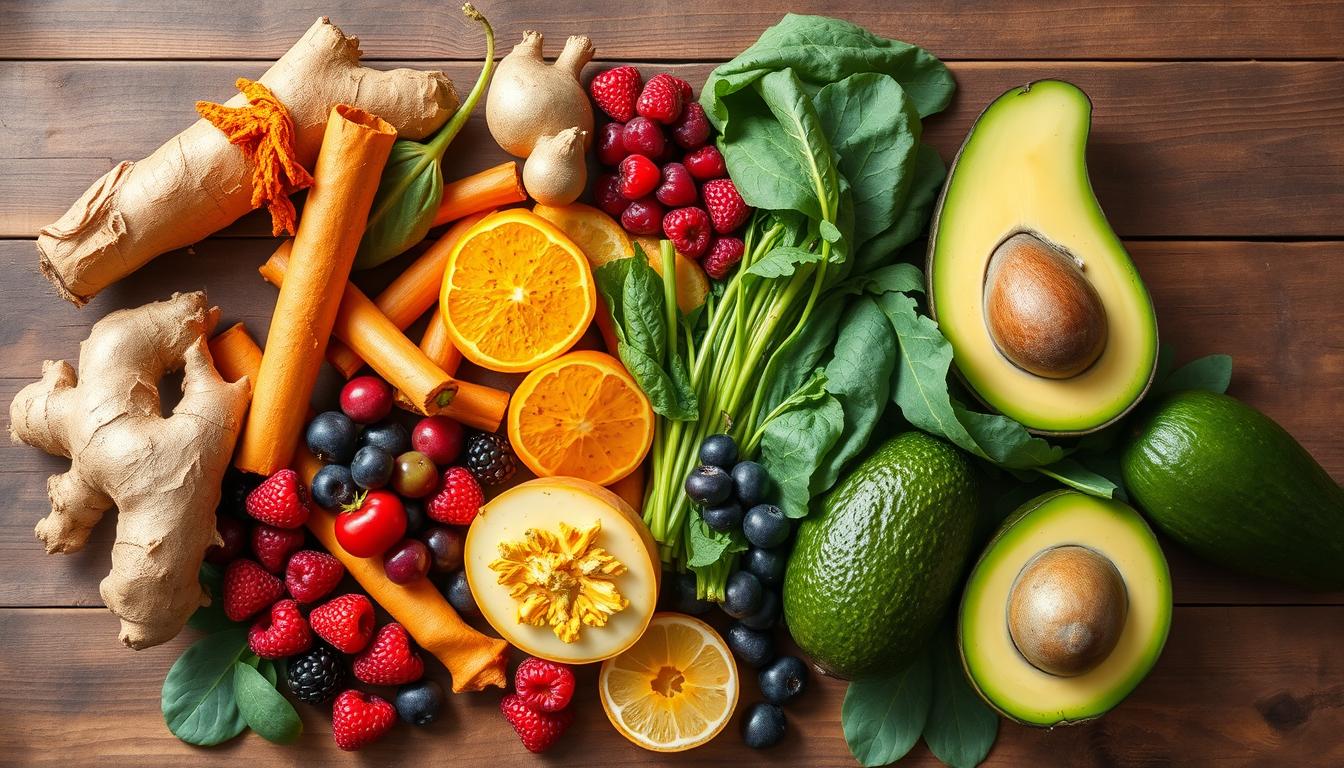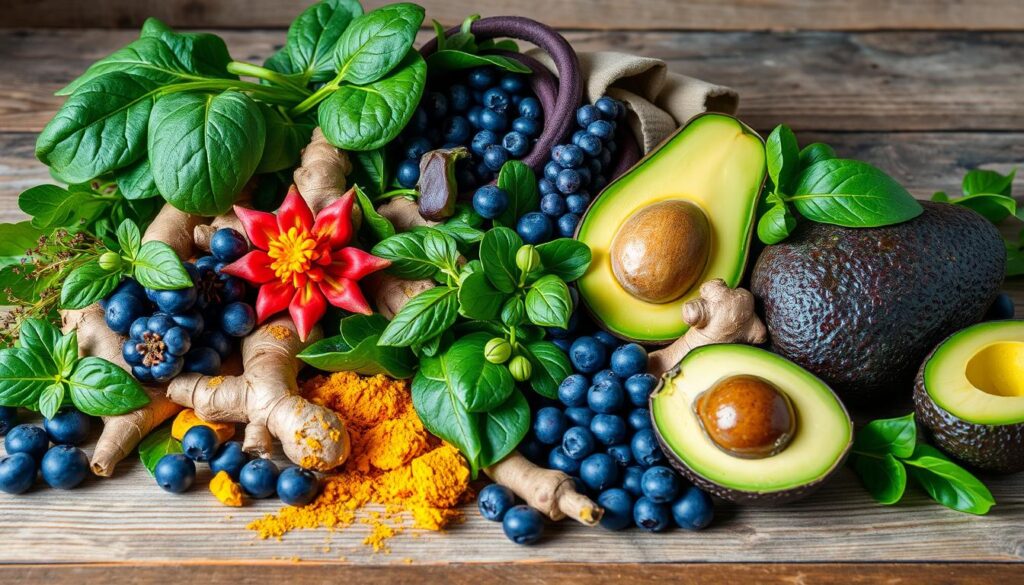
As I sit to write this, memories of my grandmother’s kitchen come flooding back. The smell of herbs and the bright colors of fresh produce were always there. It was where I learned about the healing power of food. This knowledge is more important now than ever.
Today, chronic inflammation is a big concern for our health. It can last for months or even years, leading to serious health problems1.
We are what we eat, and choosing the right foods can help fight inflammation. Foods like tomatoes and spinach are more than just colors on our plates. They are powerful tools for our health, helping us avoid issues like obesity, heart disease, and Alzheimer’s12.
My journey to understand anti-inflammatory foods has been personal. It’s a path many of us take to fight inflammation. Join me on this journey. Let’s change how we see our food and our health.
Key Takeaways
- Chronic inflammation is a silent enemy, linked to many health problems1.
- Choosing anti-inflammatory foods can help prevent and manage chronic diseases2.
- The Mediterranean diet and foods high in omega-3s and polyphenols are great allies1.
- Knowing which foods cause inflammation lets us make better health choices12.
- Small changes in our diet can greatly reduce inflammation over time1.
Understanding Chronic Inflammation and Its Impact on Health
Exploring health and wellness shows us how our bodies react, including inflammation. This process is usually helpful but can be harmful if it lasts too long. Chronic inflammation can cause many health problems. Eating foods that fight inflammation can help manage these issues.
Defining Acute vs. Chronic Inflammation
Acute inflammation is a quick response to injury or infection, showing as swelling and pain. It usually goes away in a few days. Chronic inflammation, however, can last for years, damaging tissues and organs. It’s a hidden threat that requires diet changes and exercise to fight.
Chronic Inflammation’s Role in Disease
About 60 million Americans have diseases like arthritis because of chronic inflammation3. Also, 3 in 5 people worldwide die from chronic inflammatory diseases34. These diseases range from arthritis to heart disease, showing how big of a problem inflammation is4.
How can we combat this? The Centers for Disease Control and Prevention say to do at least 150 minutes of exercise a week to fight inflammation3. Eating a Mediterranean-style diet, full of fatty fish and leafy greens, is also key to reducing inflammation3.
Adding fruits and vegetables rich in polyphenols can also help prevent diseases3. Following an anti-inflammatory diet can lower inflammation and reduce health risks.
Understanding and fighting chronic inflammation is crucial. Changing our diet is a big part of this fight. The food we eat and our lifestyle can greatly improve our health.
| Condition | Linkage to Chronic Inflammation |
|---|---|
| Cardiovascular diseases | Directly linked through arterial inflammation |
| Autoimmune diseases | Immune system attacks healthy cells |
| Neurodegenerative diseases | Associated with chronic brain inflammation |
| Mental health conditions | Inflammation aggravates symptoms |
Adding foods that fight inflammation and staying active can help fight chronic inflammation. Knowing how it affects us and how to fight it lets us live healthier lives.
Foods that can help you fight body inflammation
To fight inflammation, adding certain foods to your diet is key. Let’s look at some powerful foods you can eat every day.

Seafood like salmon or mackerel is great for reducing inflammation. They are full of omega-3 fatty acids. Eating these fish can lower inflammation markers5.
- Berries: Berries are packed with antioxidants. Eating strawberries can help lower heart disease risk5.
- Green Tea: Green tea’s polyphenols fight inflammation. They also lower the risk of chronic diseases5.
- Dark Chocolate: Dark chocolate’s flavanols reduce inflammation and boost heart health5.
Fiber is also key for fighting inflammation. Most Americans don’t get enough fiber, which is important for gut health and reducing inflammation6.
Too much sugar can make inflammation worse. Americans eat way too much added sugar, more than the recommended amount6. Cutting down on sugar can help control inflammation.
Adding these anti-inflammatory foods to your diet can help manage chronic inflammation. This can prevent and help manage health issues like heart disease, diabetes, and autoimmune conditions6.
Recognizing and Avoiding Inflammatory Foods
Our journey to fight body inflammation starts with knowing what causes it. Many foods in our daily diets can actually increase inflammation. By changing these foods, we can greatly improve our health.
Common Inflammatory Foods to Eliminate
Many foods in our diets can cause inflammation. Red and processed meats are big culprits7. Eating too much of these can lead to serious health issues like heart disease and type 1 diabetes7.
High amounts of added sugars and trans fats in processed foods also cause inflammation7. These can harm the heart, brain, and other important organs7.
Reading food labels carefully helps us avoid these bad ingredients. Many processed foods hide unhealthy fats and sugars under different names. We must stay alert8.
Healthier Cooking Methods to Reduce Inflammation
Changing how we cook can also help fight inflammation. Choosing to bake, steam, or grill instead of fry cuts down on unhealthy fats. Using oils like olive or avocado oil instead of butter or margarine can also make a big difference.
It’s important to eat more natural, whole foods. An anti-inflammatory diet focuses on these foods and avoids processed ones. This is key for reducing inflammation and improving health7.
In the end, fighting body inflammation is about choosing fresh, less processed foods. Avoiding foods that cause inflammation and cooking in healthier ways sets the stage for a lifestyle that fights inflammation well.
Nutrients Vital for an Inflammation-Fighting Diet
Starting a diet to fight inflammation means making smart food choices. I’ve looked into many studies and expert advice. Omega-3 fatty acids are great for fighting inflammation. Eating 3 to 4 ounces of omega-rich fish like salmon or mackerel twice a week is good advice from health experts9. You can also get these nutrients from plant-based foods like flaxseeds and walnuts.
Antioxidants are key in fighting inflammation. Eating 1½ to 2 cups of fruits and 2 to 3 cups of vegetables daily is recommended9. Foods like berries, spinach, and beets are full of antioxidants. They help fight inflammation. Adding at least one cup of fiber-rich beans twice a week can also help9.
For better gut health, include foods like yogurt with probiotics and garlic with prebiotics. Garlic is not just tasty but also fights inflammation and lowers cholesterol9. Using two to three tablespoons of olive oil daily can also help fight inflammation9. By eating these foods, we can follow a Mediterranean diet. This diet has been shown to reduce inflammation and lower the risk of chronic diseases109.
FAQ
What foods are considered the best for reducing inflammation?
Foods rich in omega-3 fatty acids like salmon and mackerel are great for fighting inflammation. Fruits and veggies with antioxidants, such as berries and leafy greens, are also good choices. Plus, polyphenol-rich foods like olive oil and green tea are excellent for an anti-inflammatory diet.
How does chronic inflammation impact my health?
Chronic inflammation raises the risk of many diseases, including obesity, diabetes, and heart disease. It can also lead to cancer and neurological issues like Alzheimer’s disease. This ongoing inflammation damages healthy cells and tissues, causing systemic diseases.
What is the difference between acute and chronic inflammation?
Acute inflammation is a short-term response to injury or infection, helping with healing. Chronic inflammation, however, is a long-term, low-grade response that can last for months or years. It can lead to chronic diseases.
Can cooking methods affect inflammation in my body?
Yes, how you cook can affect inflammation. Deep frying and grilling red meats at high heat can create compounds linked to cancer and inflammation. Using healthier methods like baking or steaming can reduce these harmful compounds and support an anti-inflammatory diet.
What inflammatory foods should I avoid?
To reduce inflammation, limit or avoid red and processed meats, foods with added sugars, trans fats, and refined carbs. Opt for whole, natural foods that are anti-inflammatory instead.
How do probiotics and prebiotics fit into an anti-inflammatory diet?
Probiotics and prebiotics are key for a healthy gut microbiome, which helps control inflammation. Eating foods like yogurt and kefir for probiotics, and fiber-rich foods like garlic and bananas for prebiotics, supports gut health and reduces inflammation.
Are there any immediate benefits to adopting an anti-inflammatory diet?
Many people see improvements in symptoms like pain and swelling, and feel more energetic and have better digestion on an anti-inflammatory diet. The long-term benefits, like a lower risk of chronic diseases, make it a great choice for health.
Is an anti-inflammatory diet also good for weight management?
Yes, an anti-inflammatory diet focuses on whole foods and avoids processed items, aiding in weight management. It includes fiber-rich foods that help you feel full, control appetite, and support healthy weight loss or maintenance.
Source Links
- Anti Inflammatory Diet – https://www.hopkinsmedicine.org/health/wellness-and-prevention/anti-inflammatory-diet
- Anti-Inflammatory Diet: Road to Good Health? – https://www.webmd.com/diet/anti-inflammatory-diet-road-to-good-health
- Understanding chronic inflammation (and four ways you can manage it) – https://www.labcorp.com/understanding-chronic-inflammation-and-four-ways-you-can-manage-it
- Inflammation: What You Need To Know – https://my.clevelandclinic.org/health/symptoms/21660-inflammation
- The 13 Most Anti-Inflammatory Foods You Can Eat – https://www.healthline.com/nutrition/13-anti-inflammatory-foods
- 9 healthy eating tips that can help reduce inflammation – https://health.ucdavis.edu/blog/good-food/9-healthy-eating-tips-that-can-help-reduce-inflammation/2023/11
- Anti-Inflammatory Diet: What To Eat (and Avoid) – https://health.clevelandclinic.org/anti-inflammatory-diet
- Foods that Cause Inflammation & How to Reduce Inflammation – UChicago Medicine – https://www.uchicagomedicine.org/forefront/gastrointestinal-articles/2020/september/what-foods-cause-or-reduce-inflammation
- No title found – https://www.arthritis.org/health-wellness/healthy-living/nutrition/anti-inflammatory/anti-inflammatory-diet
- Anti-Inflammatory Diet 101: How to Reduce Inflammation Naturally – https://www.healthline.com/nutrition/anti-inflammatory-diet-101






